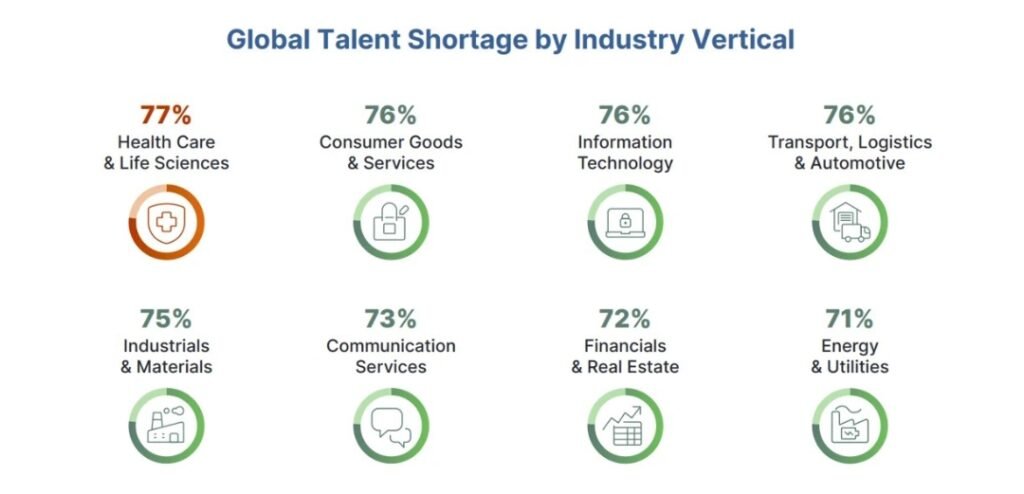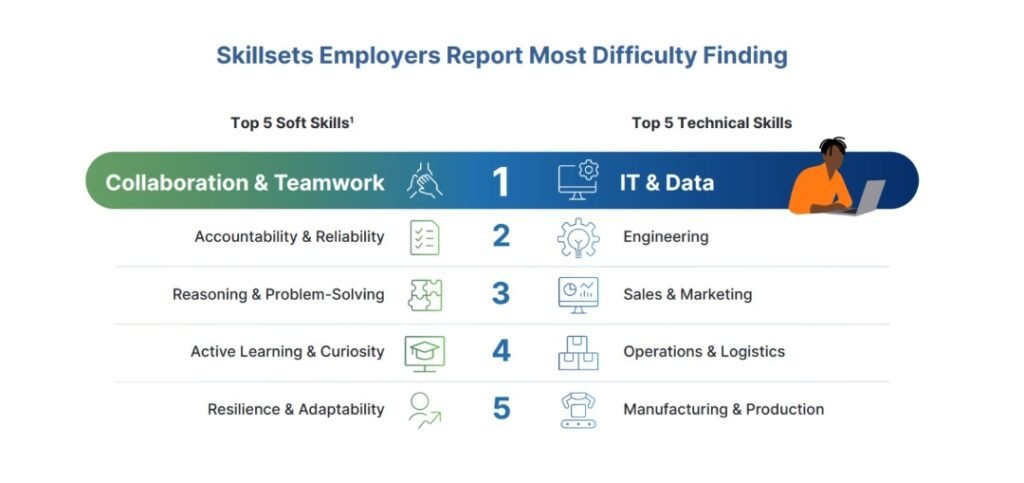
Global trade hit a record $33 trillion in 2024.
The world is becoming more interconnected as products and services from distant regions reach their markets and user bases on the other side of the globe.
This international nature of the economy rings true even for the manner in which companies source employees.
Offshore staffing—the practice of hiring employees from another country to work remotely for that company—has allowed small and medium businesses to flourish in highly competitive environments.
It’s an innovative business model that leverages a cost-effective labor force without compromising on quality.
Let’s look at how this all works and how a business can work with providers like Kinetic Innovative Staffing for solutions to their toughest challenges.
I. The Growth of Offshore Staffing – A Business Game-Changer

Offshore staffing started as a cost-saving strategy and got its foot in the door by providing small and medium businesses with a feasible way to compete in hotly contested markets.
Today, offshore staffing has become a full-blown business strategy that brings a broad range of benefits.
Here are some of the factors that have made offshore staffing possible:
- Technology: Cloud-based tools like Slack, Zoom, Trello, and Google Workspace have removed the need for physical proximity. Teams can work together seamlessly regardless of geography.
- Globalization of Talent: Professionals worldwide now have access to the same training, certifications, and resources as those in developed countries.
- Shift in Work Mindsets: Before companies turned to offshore talent, their own local hires were already working outside of the office. It’s only a little step to realize that employees can work from more cost-efficient countries.
- Rise of Third-party Providers: Providers like Kinetic Innovative Staffing have made tapping remote talent so easy and fast—with Kinetic Staff quickly making their presence felt.
II. Why Small & Medium Businesses Are Leveraging Offshore Talent
1) Cost Efficiency Without Sacrificing Quality
The cost savings from hiring remote staff cannot be ignored.
A lead generation expert costs around $50K as a local hire, but outsourcing to the Philippines, for example, will only run you about $20K—an easy reduction of 60%.
Other roles can lower labor costs by as much as 76%, and that’s just one layer of the savings stack. Since remote employees work from their homes, companies do not have to invest in office infrastructure or pay for utilities. Remote employees also don’t have the same benefits as more expensive local hires.
Remote assets are just as qualified, holding advanced degrees and having deep experience in their fields. Since they’re filtered with skill-based evaluation, one can be sure of hiring only the experts. Organizations don’t compromise on quality by hiring them.
2) Scalability & Business Growth
In the old days, businesses had to be optimistic and pessimistic at the same time, guarding that they don’t grow too big too fast.
As a result, they’re not able to fully capitalize on the good years or maximize on growth opportunities.
Offshore staffing allows teams to scale up or down based on fluctuating needs, such as seasonal spikes or project-based requirements. For example, retail companies can expand customer support teams during holiday seasons and reduce them afterward.
This flexibility allows companies to really lean in on growth opportunities and maximize profits.
3) Access to a Global Talent Pool
Talent shortages have long plagued Western labor markets.
According to ManPowerGroup’s 2024 Global Shortage Report, 75% of organizations face difficulties in filling vacant roles.

Offshore staffing addresses the issue by bridging Western companies with professionals in other places, such as the Philippines, India, Vietnam, and South America.
In the tech field, where the shortage is most acutely felt, offshore staffing provides experts in fields like software engineering, SEO, or data analytics at better rates.

III. Key Roles That Can Be Outsourced for Business Success
- Administrative Support & Virtual Assistants
Hiring remote staff for tasks like calendar management, inbox sorting, data entry, and report preparation, frees up your local team to focus on higher-value work.
- Customer Service & Sales Teams
The cost efficiencies mentioned allow for bigger teams to support customers through phone, chat, or email—while also generating leads, handling follow-ups, and boosting conversions.
- IT & Software Development
Build and maintain websites, apps, and digital systems with skilled offshore developers—without the high cost of local talent.
- Digital Marketing & Content Creation
One can run SEO campaigns, manage social media, design graphics, and write high-quality content remotely—helping the brand grow on a meager budget.
- Finance & Accounting Specialists
Remote accountants are just as meticulous and methodical. Your bookkeeping, payroll, and invoicing functions won’t skip a beat.
IV. How Offshore Staffing Helps Businesses Stay Competitive

1) Better Business Execution
From the customer’s perspective, what matters most is how fast, accurate, and consistent the service feels. When a business outsources to experts or specialists, it essentially speeds up execution, streamlining operations.
These benefits are felt by customers through faster response times, more personalized customer service, and an overall lift in service quality.
When an organization defers to subject matter experts, instead of overwhelming in-house staff with a broad range of discordant tasks, the difference is immediately palpable.
Offshore staffing isn’t about just getting work done cheaper—it’s about structuring operations so the right people are doing the right work at the right time. When that happens, winning business performance follows.
2) Fueling Strategic Investments
Lower overhead means businesses can afford to take more calculated risks—launching a new product line or testing a new marketing channel.
Offshore staffing shifts resources from keeping the lights on to building something better.
The savings can be channeled to a whole host of worthwhile activities.
For example, businesses can choose to invest in tools, training, and infrastructure they might otherwise delay.
All this can raise the level of service, professionalism, or product quality that customers can appreciate—making the brand more competitive.
3) Building Resilience
One of the most underestimated advantages of offshore staffing is how it enables a business to stay nimble — a key ingredient for surviving unpredictable markets.
Operational agility gives business owners peace of mind. Instead of worrying about sunk costs in the form of full-time salaries, they can align staffing numbers more closely with business needs.
They can mix and match the competencies needed by the organization. As the business evolves, so do the skills needed to help grow it. As the goals and directions evolve, so does the type of personnel expertise needed.
With offshore outsourcing, organizations become agile on budget.
V. Overcoming Common Concerns & Misconceptions

Let’s quickly answer some of the common worries leaders might have with remote staff:
1) “Quality control is harder with remote staff.”
The thing that made offshore outsourcing possible is also the thing that makes it successful.
For every business owner’s worry, is a software tool specifically designed for it.
Project management platforms (like Asana or Trello), CRMs, screen monitoring tools (like Time Doctor or Hubstaff), and regular performance check-ins make it easy to track productivity and outcomes.
In fact, many businesses find that output becomes more structured and measurable when working with offshore teams, simply because the workflow becomes more process-driven.
2) “Will time zones be a problem?”
Many small business owners worry that offshore teams might slow things down due to time zone differences.
In truth, this is not only manageable, they often become a competitive advantage. That is, you’d want the time zone differences.
Why?
Because it allows organizations to render 24/7 service, or, it keeps work continuously progressing. So while the home team is off, somebody from the other side of the world is holding the fort. And then, when the home team wakes up, their remote colleagues hands off the work—keeping the organization continuously productive.
Collaboration tools like Slack, Zoom, and Loom make asynchronous work seamless.
Regardless of this though, most offshore staff will adapt to your preferred hours or work overlapping shifts. So, no, time zone differences are not a problem.
3) “Is offshore staffing secure?”
That’s a valid concern. Data protection is an important issue for an information society.
Reputable remote staffing providers implement international protocols like ISO 27001, GDPR compliance, NDAs, and VPN-based infrastructure to protect sensitive data.
Providers have structured onboarding protocols, security training, and secure access to their platforms so that business owners have the peace of mind that their confidential information isn’t compromised. In addition, many offshore staffing providers regularly audit their systems and update their protocols to keep up with evolving security standards.
With the right partner, offshore staffing can be just as secure — if not more — than in-house operations, especially when backed by a robust combination of technology, policy, and accountability.
Offshore staffing has moved far beyond its early reputation as a cost-saving tactic. It has become a full-fledged strategic lever for businesses to optimize their operations and deliver better customer service
The most successful business organizations aren’t asking whether they should consider offshore staffing — they’re asking how fast they can build a reliable, high-performing offshore team.